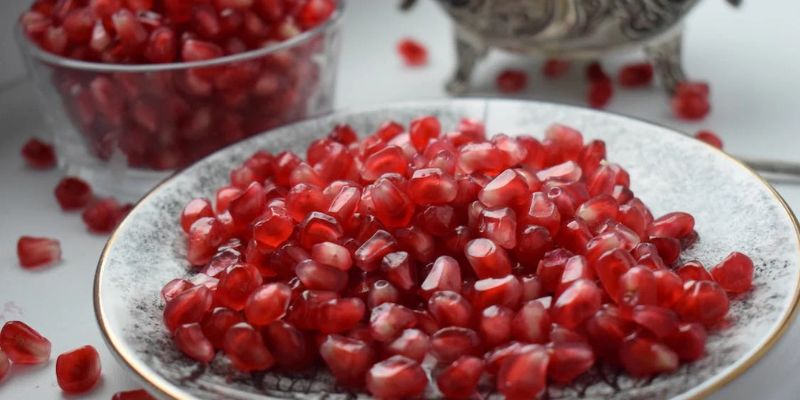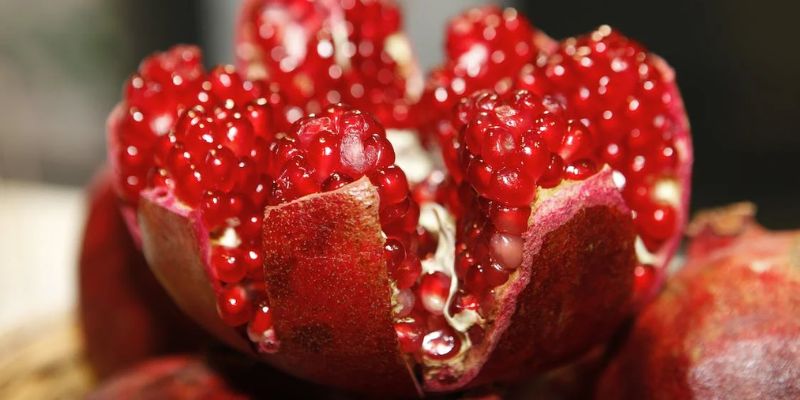Pomegranates stand out not only for their vibrant taste but also for their impressive health benefits. Packed with essential nutrients, these ruby-red jewels offer a unique combination of antioxidants, vitamins, and minerals. One key element that makes pomegranates so nutritious is their high concentration of polyphenols, particularly punicalagin and anthocyanins, known for their antioxidant properties. These antioxidants play a crucial role in neutralizing free radicals, thus potentially reducing the risk of chronic diseases. The fruit's anti-inflammatory effects and potential cardiovascular benefits further solidify its status as a nutritional powerhouse, making it a delicious and healthful addition to any balanced diet.

Nutritional profile of pomegranate
Pomegranates pack a nutritious punch. One cup of arils (the juicy red seeds) contains:
- Protein: 4.7 grams of DV (Essential for building and repairing tissues, supporting the immune system)
- Fat: 3.3 grams of DV (Plays a crucial role in nutrient absorption, provides a concentrated energy source, and contributes to the structure of cell membranes)
- Carbohydrates: 52 grams of DV (The primary energy source for the body, essential for brain function and physical activities).
- Vitamin C: 32% of the Daily Value (An antioxidant that helps protect cells from damage and boosts the immune system).
- Folate: 27% of the DV (Essential for DNA synthesis, cell division, and the formation of red blood cells, playing a crucial role in overall growth and development).
- Magnesium: 8% of the DV (helps regulate blood sugar levels and contributes to bone and muscle health)
- Phosphorus: 8% of the DV (Important for forming and maintaining strong bones and teeth and essential for energy metabolism)
- Potassium: 13% of the DV (Maintains proper fluid balance, helps regulate blood pressure, supports muscle contractions, and contributes to overall heart health)
Pomegranates also contain antioxidants like anthocyanins, which give them their bright red color. Antioxidants help protect your cells against damage and may help reduce the risk of some diseases.
The Health Benefits of Eating Pomegranate

The pomegranate is a nutritional powerhouse. Pomegranates contain antioxidants like flavonoids that can help lower high blood pressure and reduce arterial inflammation. Studies show pomegranate juice may lower LDL "bad" cholesterol and raise HDL "good" cholesterol. The antioxidants in pomegranates can help prevent and even reverse atherosclerosis or hardening of the arteries.
The antioxidants in pomegranates have been shown to help fight the growth of cancer cells and may even kill some cancer cells. Pomegranate extracts have been shown to inhibit the growth of breast, colon, prostate, and lung cancer cells in test tubes. Animal studies and some human research suggest pomegranates may help slow or prevent various types of cancer.
Pomegranates contain punicalagin, an antioxidant that may help boost brain function and improve memory. Some research shows pomegranate juice can help improve memory and cognitive abilities in older adults with age-related memory decline. Pomegranates may even help fight Alzheimer's disease and dementia.
Pomegranates contain fiber, potassium, and other minerals essential for digestive health and regularity. The antioxidants in pomegranates can help reduce gut inflammation and improve the microbiome. Pomegranate juice may help relieve symptoms like diarrhea, constipation, and indigestion.
Pomegranates pack a lot of nutrition in a small package. Adding this fruit to your diet can significantly benefit your heart, brain, gut, and overall health.
Pomegranate Seeds Benefits
The ruby red seeds of the pomegranate contain hundreds of juicy seeds, bursting with nutrition.
Eating about 1/2 cup of pomegranate seeds provides over 100% of your daily vitamin C and other minerals. Add the red seeds to yogurt or oatmeal, toss in salads, or enjoy them by the handful for a burst of nutrition and sweet-tart flavor.
How to Add More Pomegranates to Your Diet
Pomegranates are little powerhouses of nutrition. Adding more of them to your diet is easier than you think with these tips and recipe ideas.
The juicy seeds, also known as arils, are delicious. Just split open a pomegranate and enjoy the roots by the handful. Mix them into yogurt or oatmeal for extra crunch. Pomegranate juice is a tart and refreshing drink, but it works excellently as a mixer. Add a splash to sparkling water for a fizzy treat or use in place of cranberry juice in a cocktail. For a non-alcoholic option, combine pomegranate juice with seltzer and a squeeze of lime.
Whisk together pomegranate molasses, olive oil, and fresh herbs like mint or parsley for a tangy salad dressing or marinade. The sweet-tart molasses is made from reduced pomegranate juice and adds flavor.
Try pomegranate salsa on fish or chicken. Combine pomegranate seeds with diced mango, red onion, cilantro, and lime juice. Let the flavors blend for at least 30 minutes, then spoon over grilled fish, chicken, or pork. The fresh, fruity salsa also pairs excellent with creamy avocado.
With so many uses, pomegranates can quickly become a regular part of your healthy diet. Eating them and drinking their juice helps you load up on antioxidants and may even help lower cholesterol and blood pressure. Turns out something so tasty can be good for you!
Conclusion
So there you have it, all the reasons you need to add more pomegranates to your diet. Pomegranates are a nutritional powerhouse packed with antioxidants, vitamins, and minerals but low in calories. Whether you enjoy the tart juice and crunchy arils or find creative ways to cook the seeds into salads, marinades, and desserts, pomegranates deserve a place on your table. Your body and taste buds will thank you, and you'll be well on your way to better health and more vibrant living. What are you waiting for? Head to the store and pick up some ruby red wonders. Your new favorite fruit is waiting to be discovered.







